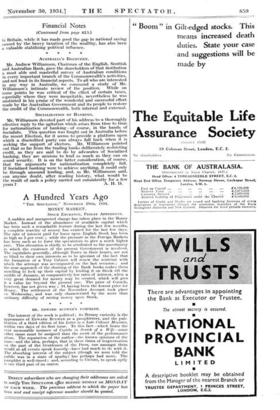A Hundred Years Ago
" THE SPECTATOR," NOVEMBER 29m, 1834. MONEY MARKET.
STOCK EXCHANGE, FRIDAY AFTERNOON.
A sudden and unexpected change has taken place in the Money Market. Instead of the abundance of available capital which has been such a remarkable feature during the last few months, a complete scarcity of money has existed for the last few days. The rate of interest paid for loans upon English Stock has been as high as 5 per cent. ; while the pressure in the Foreign Markets has been such as to force the speculators to give a much higher rate. This alteration is chiefly to be attributed to the uncertainty in which the existence of the present Government is involved. The capitalists generally, although Tories in their hearts, are not so blind to their own interests as to be ignorant of the fact that the formation of a Tory Cabinet will renew the mistrust with which the attempt was accompanied on the last occasion ; and the near approach of the shutting of the Bank books makes them unwilling to lock up their capital by lending it on Stock till the middle of January, at comparatively low rates of interest, when a very great demand for money may be created, which will give it a value far beyond the present one. The price of Consols; however, has not given way ; 91 having been the lowest price for Money. The settlement of the November Account took place on Wednesday, and was only characterized by the more than ordinary difficulty of raising money upon Stock.
* * * *
MR. EDWARD BCLWER'S PAMPHLET.
The interest of the week is political ; its literary curiosity is the appearance of EDwARD BITLWER as a pamphleteer, and the pub- lication of a third edition of his Letter to a Late Cabinet Minister, within two days of its first issue. To this fact—which beats the ever memorable instance of Coelebs in Search of a Wife—some other cause must be assigned than the merit of the performance alone. The reputation of the author—the known opinions of the man—and the idea, perhaps, that in these times of tergiversation on the part of the Gentlemen of the Press, one amongst them would at all events speak honestly—have had much to do with it. The absorbing interest of the subject (though we were told the public was in a state of apathy) has perhaps had more. The pamphlet is well-timed ; and, according to CICERO, to speak aptly Is one third part of an orator.










































 Previous page
Previous page